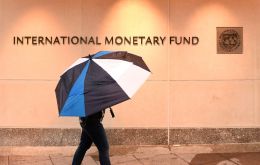MercoPress. South Atlantic News Agency
Tag: public debt
-
Saturday, December 18th 2021 - 09:02 UTC
Global Debt Reaches a Record US$226 Trillion

By Vitor Gaspar, Apulo Medas, and Roberto Perrelli (*) – In 2020, we observed the largest one-year debt surge since World War II, with global debt rising to US$ 226 trillion as the world was hit by a global health crisis and a deep recession. Debt was already elevated going into the crisis, but now governments must navigate a world of record-high public and private debt levels, new virus mutations, and rising inflation.
-
Thursday, October 29th 2020 - 09:10 UTC
Brazilian government borrowing jumped to second highest record in September

Brazilian government borrowing jumped to its second-highest on record in September, Treasury figures showed, meaning Brazil issued more debt in the first nine months of this year than the whole of last year.
-
Thursday, October 22nd 2020 - 08:28 UTC
Britain's record borrowing because of Covid-19; total public debt 103,5% of GDP

Britain’s government borrowing in the first half of the financial year was more than six times higher than before the COVID pandemic, official figures showed on Wednesday, taking public debt to its highest since 1960.
-
Saturday, July 18th 2020 - 09:14 UTC
Argentina's bill to restructure public debt in dollars issued under local law

Argentina’s government sent a bill to Congress late on Thursday night laying out its plans to restructure public debt in dollars issued under local law, offering creditors new instruments in both foreign currency and pesos.
-
Thursday, May 7th 2020 - 12:47 UTC
Restructuring Argentina’s Private Debt is Essential

By Joseph Stiglitz, Edmund S. Phelps, and Carmen Reinhart (*) – Argentina's creditors are being asked to accept a proposal that would reduce their revenue stream but make it sustainable. A responsible resolution will set a positive precedent, not only for Argentina but for the international financial system as a whole.
-
Thursday, February 27th 2020 - 08:15 UTC
The Challenges of Argentina’s Debt Renegotiation

By Jose Antonio Ocampo (*) – By affirming that Argentina's public-sector debt is unsustainable, the International Monetary Fund has taken a critical step toward resolving the country's long-running crisis. Moving forward, one hopes that the Fund will realize its own role in the latest crisis and follow its own advice on when to pursue capital-market liberalization.
-
Monday, January 13th 2020 - 09:30 UTC
Argentine president puts a deadline to renegotiates public debt: March 31

President Alberto Fernandez said he has set a March 31 deadline to renegotiate Argentina’s rampant public debt and that a more “innovative” International Monetary Fund approves of the direction his government is taking.
-
Monday, October 14th 2019 - 09:56 UTC
Peace in Ecuador: Government and protestors strike a deal; sharp rise in fuel prices suspended

President Lenin Moreno and leaders of Ecuador's Indigenous peoples struck a deal late Sunday to cancel a disputed austerity package and end nearly two weeks of protests that have paralyzed the economy and left seven dead.
-
Tuesday, April 12th 2011 - 16:13 UTC
China to keep buying Spanish public debt and invest in financial industry

China will invest in Spain’s savings-bank industry and continue buying public debt, a Spanish government official cited Chinese Premier Wen Jiabao as telling Prime Minister Jose Luis Rodriguez Zapatero at a meeting Tuesday in Beijing.
